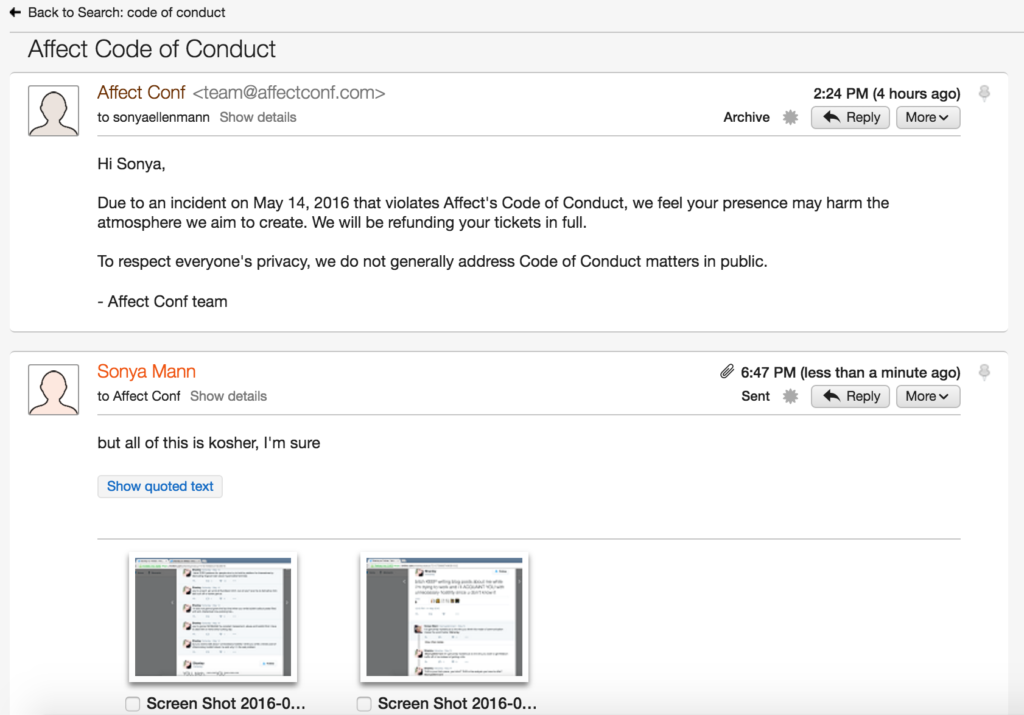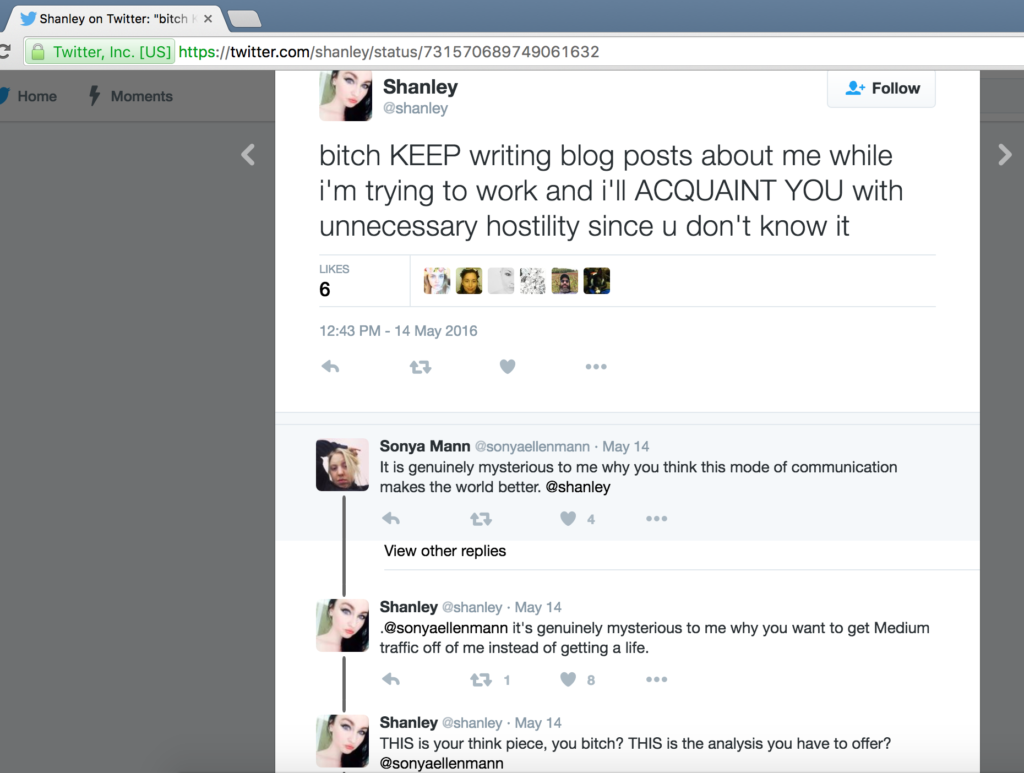Unless you really love subculture drama, read “Hostility & Online Discourse, Round Two” instead, or my earlier post about giving and receiving criticism.
Here’s the tl;dr, which gets repeated later in the essay:
Hostility in online discourse is very rarely useful. I understand the rage impulse, especially as a marginalized person trying to explain something that seems obvious to a more privileged person — that was my modus operandi as a sex worker — but it is counterproductive. It does not engender sympathy or encourage people to learn more. You know what does? Assuming best intent and treating people with respect even when you’re disagreeing with them.
Something happened on Twitter just now that illustrates a disturbing trend. (I know, what a fortuitous opening!) Let me establish some context first. Shanley Kane, who runs diversity-in-tech publication Model View Culture, tweetstormed this morning that readers don’t support the indie media outlets they claim to adore (presumably in response to The Toast shutting down).
these sites are not struggling because of what big sites *are* doing, they are struggling because of what their audiences aren't doing
— shanley (@shanley) May 14, 2016
Her contention is that indie media’s struggles are the readers’ fault, because they don’t chip in, even when given ample opportunity. I don’t totally agree with her thesis due to some ideological differences re: markets and business models, but that’s beside the point. Her tweetstorm was very interesting and I’m glad she spoke her mind.
Anyway, reader Gavin Carothers commented that he would contribute if the sites he frequents offered the possibility:
would help if more indie media LET readers pay. Some don’t 😟
— Gavin Carothers (@gcarothers) May 14, 2016
Kane quote-retweeted his comment with her own: “This is trash”. Her response seemed unnecessarily hostile to me. So I chimed in: “but it’s literally true — e.g. The Billfold never accepted donations” (which I’ve written about before because it frustrated me so much).
Kane responded, “This is a blatant derail. Tons of indie media has literally dozens of ways to financially support.” In case you’re not familiar with the concept, “Derailment occurs when discussion of one issue is diverted into discussion of another issue, often by the group who were being called out about their bad behaviour in the first place.”
Whether or not Carothers’ comment counts as derailing is a subjective judgment, but let’s grant that it is for the sake of discussion. Here’s a way that Kane could have responded (instead of saying, “This is trash”) which would have been much more productive: “I think that’s beside the point since most indie media sites do allow readers to contribute.” Same message, expressed in a way that isn’t likely to alienate Carothers or anyone else who’s not acquainted with Kane’s conversational expectations.
Finally I can get to my point: Hostility in online discourse is very rarely useful. I understand the rage impulse, especially as a marginalized person trying to explain something that seems obvious to a more privileged person — that was my modus operandi as a sex worker — but it is counterproductive. It does not engender sympathy or encourage people to learn more. You know what does? Assuming best intent and treating people with respect even when you’re disagreeing with them.
For example, I’ve talked to numerous men who have very negative feelings about feminism because whenever they’ve tried to participate in feminist conversations, they’ve gotten yelled at. Did they say something insensitive or offensive? Quite possibly. But they had good intentions and all they needed was a good-faith explanation of why whatever they said was considered objectionable.
I have personally changed people’s minds by providing that good-faith explanation. Defining unfamiliar terms, elaborating on unfamiliar perspectives, and asking questions about what the sticking points are. When conversational participants commit to being kind to each other, you can iterate toward mutual understanding. I used to think that no one ever changed their mind in online conversation. Actually, it turns out that no one changes their mind when the conversation consists of people yelling past each other. “Ugh, I can’t believe you said that” or more extreme rejoinders like “fuck off, you evil misogynist” do more damage to women’s liberation than whatever the guy might have said in the first place.

True, providing the basic good-faith explanations over and over again can be emotionally exhausting. Sometimes you don’t want to deal with providing a 101 space. It’s also perfectly acceptable to say, “I would love to go into more detail, but I’ve explained this a bunch of times before and I find it tiring to discuss. Do you mind Googling around a bit and seeing what other people have written about this?” Often it’s helpful to clarify explicitly, “Just to make sure it’s obvious, I’m not angry and I think your curiosity is awesome!”
I know some of you will say, “It’s not marginalized people’s responsibility to educate privileged people. They should take the initiative to do that themselves.” That’s an idealistic stance and it gets nothing done. Without active advocacy, there is no education and there is no change. Saying that men who don’t understand feminism should educate themselves about feminism is akin to saying that children under ten should teach themselves about the importance of hygiene. They’re fundamentally not equipped to do it.
It’s true that sometimes people enter conversations, especially about social justice, with ill intentions. But treating everyone as an enemy until they prove otherwise is very harmful — it ends up burning the people who just couldn’t figure out why you were upset without more guidance and more information. Assuming good faith is not always accurate, but it’s a much more useful stance than defaulting to hostility.
.@sonyaellenmann your post is also trash. fuck off
— shanley (@shanley) May 14, 2016
Updating on 5/5/2016 re: reaction to this piece.

Affect Conf says I violated their code of conduct. I disagreed — perhaps more snarkily than I should have, I admit — but of course it’s their prerogative to decide who gets to attend their event. These are the screenshots I attached in my response:


You can read all of Kane’s responses to what I wrote (at least all the ones I’m aware of) here, here, here, and here. (Those links aren’t in order, but Twitter is usually a cacophony anyway.)
I don’t know if this needs stating, but please do not harass Kane about this or use this as a justification for harassing her. There is no need to even bring it up — as far as I know she’s said everything she wanted to on the matter.